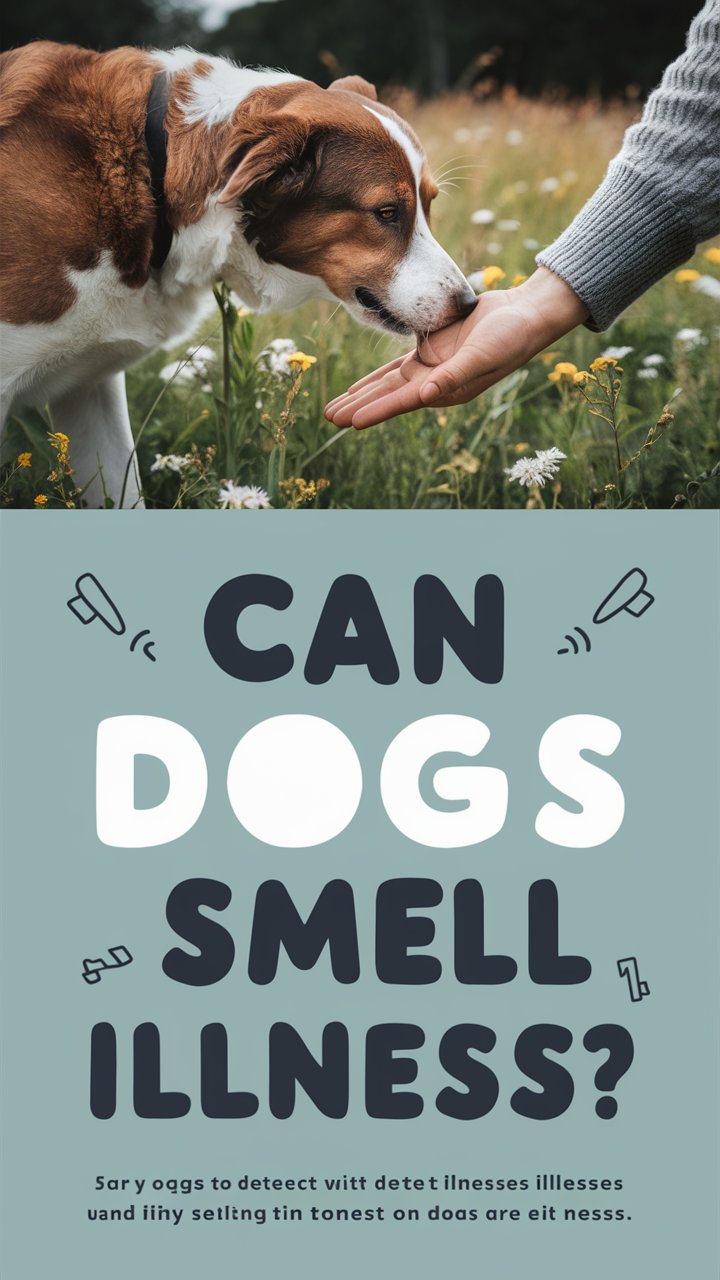Dogs are more than just loyal companions—they may also be lifesavers. Many dog owners have noticed their pups acting differently when they’re sick, stressed, or feeling down. But is there science behind this? Can dogs really smell illness, or is it just a heartwarming myth?
In this article, we’ll explore the fascinating science of canine scent detection, real-world medical uses, limitations, and how YOU can pay attention to your dog’s unusual behaviors to protect your health.
🧠 Why Dogs Have Super-Noses
Dogs’ sense of smell is often called “superhuman” — and for good reason:
- 300 million scent receptors in their noses (compared to only 5–6 million in humans).
- A part of their brain devoted to analyzing smells is 40 times larger than in humans.
- They can detect scents in parts per trillion—meaning they could theoretically smell a teaspoon of sugar in two Olympic-size swimming pools.
👉 This isn’t just impressive—it means dogs can pick up chemical changes in our bodies that we can’t even begin to notice.
🧪 The Science: How Dogs Detect Illness
When the human body undergoes illness, it releases unique chemical markers known as Volatile Organic Compounds (VOCs).
- Cancer cells, for instance, release distinct VOCs into breath, urine, and sweat.
- Diabetes causes detectable changes in blood sugar that alter a person’s scent.
- Infections or inflammations can also give off distinct chemical signals.
Dogs’ noses are essentially biological sensors—so sensitive that researchers have compared them to advanced medical machines.
🔬 Scientific Studies Proving It
- Cancer Detection: A study published in British Medical Journal (2004) showed trained dogs could detect bladder cancer in urine samples with high accuracy.
- Diabetes Alert Dogs: Organizations now train service dogs to detect low blood sugar in diabetic patients, sometimes alerting them before continuous glucose monitors do.
- Seizure Prediction: Some dogs have been documented to predict seizures minutes before they occur—though the mechanism is still not fully understood.
🐾 Real-Life Stories of Dogs Saving Lives
- The Breast Cancer Sniffer: A woman in the UK reported that her dog persistently pawed at her chest. She later discovered she had early-stage breast cancer.
- Diabetes Guardian: Many diabetic patients credit their service dogs for saving their lives by warning them before a dangerous hypoglycemic crash.
- COVID-19 Detection: During the pandemic, dogs were trained in some airports to detect COVID-19 with accuracy rates rivaling lab tests.
⚖️ Can You Rely Solely on Your Dog?
While dogs are amazing, there are limitations:
- Not all dogs are trained for medical detection.
- A dog’s behavior could mean many things—stress, boredom, hunger—not necessarily illness.
- They should never replace medical testing or professional advice.
👉 Instead, think of your dog’s instincts as an early warning system, not a diagnosis.
👀 Signs Your Dog Might Be Picking Up on Something
- Unusual sniffing or licking at a specific part of your body
- Persistent pawing or nudging at you
- Sudden clinginess or restlessness when you’re unwell
- Whining or howling near you without a clear reason
⚠️ If you notice repeated behavior like this—especially alongside your own unexplained symptoms—it may be worth checking with your doctor.
🧩 How Dogs Are Trained for Medical Detection
Training usually includes:
- Exposure to samples (like breath or urine containing disease markers).
- Reward-based reinforcement when the dog identifies the correct sample.
- Gradual introduction of real-world environments.
These dogs can eventually alert their owners with a paw, a bark, or even fetching a medical kit.
🥗 Boosting Your Dog’s Natural Abilities
Every dog has a strong nose, but you can encourage your pup’s instincts with:
- Scent games (hide-and-seek with treats).
- Brain stimulation through puzzle toys.
- Socialization & exercise to keep their mind sharp.
- Proper diet with omega-3 fatty acids, which support brain function.
❤️ Dogs’ Emotional Intelligence
It’s not just about smell. Dogs are highly empathetic. Research shows they can sense your stress hormones (like cortisol) and adjust their behavior to comfort you.
So whether it’s sniffing out cancer or simply cuddling you when you’re sad, your dog’s intuition is worth paying attention to.
📝 Key Takeaways
- Dogs have a super sense of smell that can detect illness-related chemical changes.
- Studies prove they can identify cancer, diabetes, infections, and even COVID-19.
- Dogs are not a replacement for medical professionals—but they can be a valuable early warning sign.
- Pay attention to sudden changes in your dog’s behavior. Sometimes, they know more than you think.
✅ Final Thoughts
So, can dogs smell illness? The answer is a resounding yes—with limitations. While they won’t replace your doctor, dogs have repeatedly proven themselves as lifesaving companions.
If your furry friend starts acting strange, don’t ignore it. Their keen senses might just give you an early heads-up about your health. And even if it’s nothing serious, at least you’ll have another reason to appreciate the unconditional love (and superpowers) of your loyal pup. 🐾💖
